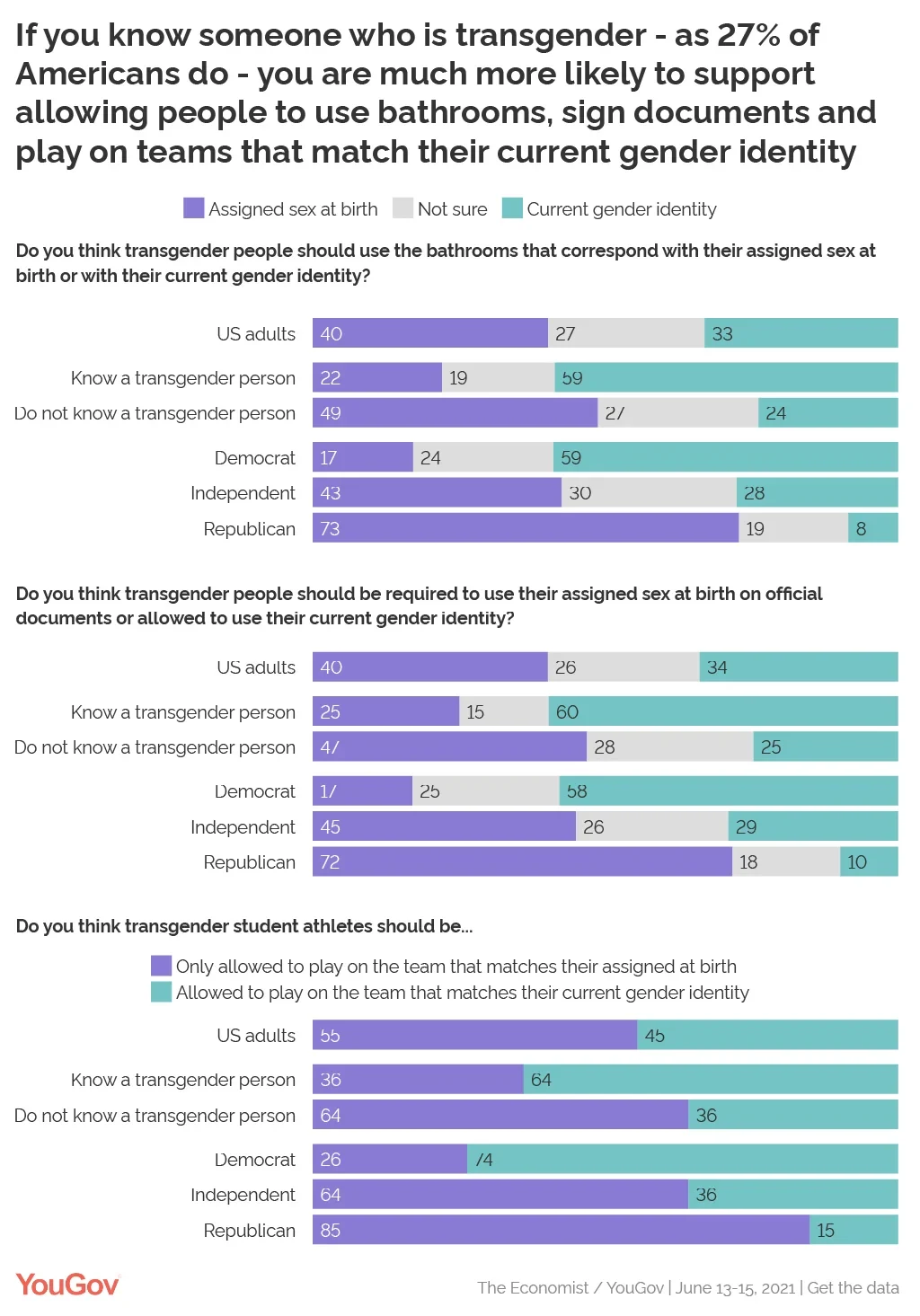With Pride Month celebrated in June every year to honor the 1969 Stonewall riots, a recent Economist/YouGov poll points to Americans recognizing that a great deal or fair amount of discrimination still happens to LGBTQ+ people (68%), especially transgender Americans (72%).
Three in five adults (62%) know someone who identifies as LGBTQ+, but only one in four know someone who is transgender (27%), and knowledge changes little based on age. Adults over 65 are the least likely of any age group to know someone who is transgender (19%).
Republicans are less likely to know someone who is LGBTQ+ (52%) or transgender (14%) than Democrats (75% and 39%, respectively) or Independents (63% and 27%, respectively).
This lack of personal contact with transgender people has implications for how Americans think about them. Those who personally know transgender people believe that gender identity (not assigned sex at birth) should determine which bathrooms transgender people use, which gendered sports teams they should play on, and how their official documents identify them.
Those who don’t know a transgender person believe the assigned birth gender should apply in all three cases. One effect of the fact that a relatively small number of Americans personally know someone who is transgender, is that the public as a whole prefers that trans people use the sex assigned at birth to apply on all these questions.
For instance, Americans tend to prefer that transgender people use the bathroom that corresponds with their assigned sex at birth (40%), rather than their current gender identity (33%). But that is vastly different for those who actually know someone who is transgender: 22% of this group believes that transgender people should use the bathrooms that match their assigned sex, 59% say they should go based off their gender identity. The public is more likely to believe athletes should play on teams of the gender they were assigned at birth (55%) rather than based on their gender identity (45%). Again, two-thirds of those who know someone who is transgender (64%) believe that transgender students should be placed on sports teams based on their gender identity, rather than assigned sex (36%).

The public continues to recognize the discrimination transgender people face: many say that transgender individuals face a “great deal” of discrimination in the U.S. today (41%) while one-third (32%) believe transgender Americans experience a fair amount of discrimination. This is similar to data from 2019, where 39% of Americans said transgender people experienced a great deal of discrimination, and 30% said it was “a fair amount” of discrimination.
While there has been little change in the perception of discrimination against transgender people in the last few years, those perceptions are especially high among those who have personal contact with a transgender individual. Among those who know someone who is transgender, 85% see at least a fair amount of discrimination against them today, with 63% sensing “a great deal” of discrimination.
While two-thirds of those who don’t personally know someone who is transgender (67%) also see discrimination, only one in three (32%) recognize “a great deal” of discrimination taking place.
There is a change in government, however, that is reflected in the poll. More than half the public, 57%, think President Joe Biden cares at least somewhat about the needs and problems of LGBTQ+ people, an increase of 20 points from a June 2020 poll, when 37% said President Donald Trump cared at least somewhat.
See the toplines and crosstabs from this Economist/YouGov poll
Methodology: The Economist survey was conducted by YouGov using a nationally representative sample of 1,500 US Adult Citizens interviewed online between June 13 - 15, 2021. This sample was weighted according to gender, age, race, and education based on the American Community Survey, conducted by the US Bureau of the Census, as well as 2016 Presidential vote, registration status, geographic region, and news interest. Respondents were selected from YouGov’s opt-in panel to be representative of all US citizens. The margin of error is approximately 3.0% for the overall sample.












